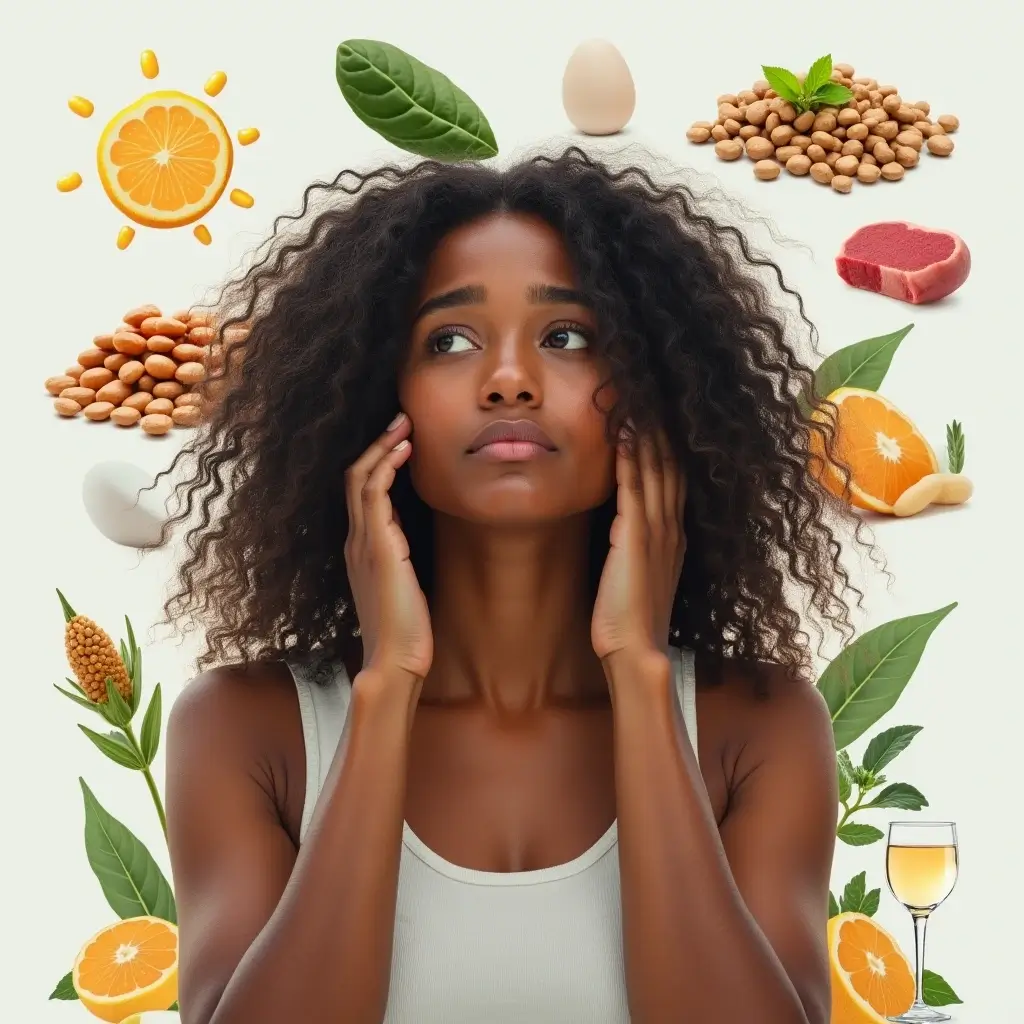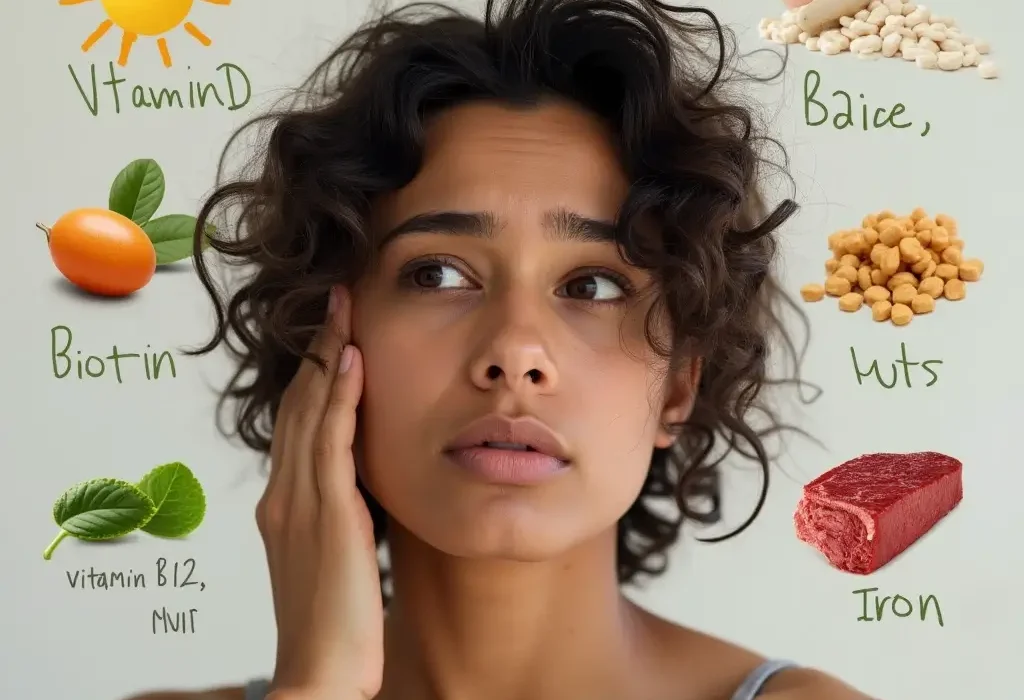Hair loss is more than just a cosmetic concern—it’s an emotional experience that can affect your confidence, self-esteem, and overall sense of well-being. If you’ve been noticing more hair in your brush or in the shower, it’s natural to wonder, “What’s causing my hair loss?” While genetic factors, stress, and certain health conditions can contribute, vitamin deficiencies are a common yet often overlooked cause of hair thinning and shedding. The good news is, you don’t have to navigate this alone. By understanding the vitamins that play a crucial role in hair health, you can take proactive steps to reverse the damage and restore your locks to their full potential.
In this comprehensive guide, we’ll explore the vitamins most commonly linked to hair loss, how deficiencies impact hair health, and the practical steps you can take to correct these imbalances. Whether you’re facing thinning hair, excessive shedding, or dry, brittle strands, this article will provide valuable insights to help you address the root cause and encourage healthy hair regrowth.
Introduction: The Connection Between Vitamin Deficiency and Hair Loss
When you notice more hair than usual on your pillow or in your drain, it can feel overwhelming. But before jumping to conclusions, it’s important to recognize that hair loss is often a result of multiple factors, with nutritional deficiencies being one of the most common culprits.
Your hair, like the rest of your body, depends on the nutrients you consume to stay healthy. In fact, hair growth is a complex process that requires a variety of vitamins, minerals, and proteins. If your body isn’t getting enough of these essential nutrients, your hair may begin to show the signs—thinning, dryness, and breakage.
One of the first steps toward reversing hair loss is identifying any vitamin deficiencies that may be contributing to your hair woes. This article will walk you through the most common vitamins that affect hair growth and how addressing these deficiencies can help you restore your hair’s strength and thickness.
How Does Vitamin Deficiency Affect Hair Growth?
Hair growth occurs in cycles, with each hair follicle going through a growth (anagen), rest (telogen), and shedding (catagen) phase. Vitamins and minerals play crucial roles in supporting these cycles, from stimulating hair follicles to promoting healthy blood circulation to the scalp. When your body lacks the right nutrients, hair follicles may become dormant or weak, leading to thinning hair and increased shedding.
A deficiency in vitamins can disrupt several processes that are vital for hair growth, including:
- Cellular metabolism: B vitamins, especially B12 and biotin, help your cells convert food into energy. This energy is needed for hair follicle cells to grow and repair.
- Protein synthesis: Your hair is primarily made of protein, and several vitamins—like vitamin A and zinc—are involved in producing keratin, the protein that strengthens hair.
- Blood circulation: Vitamins like vitamin D and iron help ensure that your hair follicles receive the oxygen and nutrients needed for healthy growth.
- Antioxidant protection: Vitamins E and C act as antioxidants that help protect hair follicles from damage caused by free radicals.
When deficiencies in any of these vitamins occur, it can lead to thinning hair, hair loss, or slower hair growth. Understanding which vitamins are most important for hair health is the key to preventing or reversing these issues.

The 10 Most Common Vitamin Deficiencies That Cause Hair Loss
While many factors can contribute to hair loss, certain vitamin deficiencies are commonly linked to thinning or shedding. In this section, we’ll dive into the top 10 vitamins and nutrients that can cause hair loss when you don’t get enough of them. Let’s explore what these vitamins do, how they impact your hair, and how you can correct the deficiency.
1. Vitamin D
What It Does: Vitamin D is essential for stimulating hair follicles and maintaining the growth phase of hair. It helps regulate the production of new hair cells, and when you don’t have enough, it can lead to hair shedding and thinning.
Deficiency Signs:
- Increased hair shedding
- Thinning hair, especially on the crown
- Dry scalp or dandruff
How to Fix It: Vitamin D is primarily obtained through sunlight exposure, so getting outside and soaking up some rays can boost your levels. You can also consume foods like fatty fish (salmon, mackerel), fortified dairy products, and egg yolks. Vitamin D supplements may also help, but consult a healthcare provider to determine the right dosage.
2. Vitamin A
What It Does: Vitamin A is vital for cell growth and the production of sebum, the natural oil that keeps your scalp and hair healthy. However, too much vitamin A can also lead to hair loss, so balance is key.
Deficiency Signs:
- Dry, flaky scalp
- Increased hair shedding
- Slower hair regrowth
How to Fix It: You can get vitamin A from foods like sweet potatoes, carrots, spinach, and kale. If you’re deficient, supplements can help, but avoid exceeding the recommended daily dose, as excessive amounts can cause hair loss.
3. Vitamin E
What It Does: Vitamin E is an antioxidant that helps protect hair follicles from oxidative damage caused by free radicals. It also improves blood circulation to the scalp, promoting healthy hair growth.
Deficiency Signs:
- Dry, brittle hair
- Increased shedding
- Scalp irritation
How to Fix It: Vitamin E is found in foods like almonds, sunflower seeds, spinach, and avocados. You can also use vitamin E oil topically on your scalp to nourish your hair follicles.
4. Vitamin C
What It Does: Vitamin C is essential for collagen production, which is a key component of hair structure. It also helps the body absorb iron, another vital nutrient for healthy hair growth.
Deficiency Signs:
- Dry, splitting hair
- Slow hair growth
- Brittle hair strands
How to Fix It: Citrus fruits (oranges, lemons), strawberries, bell peppers, and broccoli are all rich sources of vitamin C. Adding these foods to your diet can help improve hair health.
5. Biotin (Vitamin B7)
What It Does: Biotin is perhaps the most well-known vitamin for hair health. It helps convert nutrients into energy and promotes the production of keratin, the protein that makes up hair.
Deficiency Signs:
- Hair thinning
- Brittle nails
- Skin rashes or dryness
How to Fix It: Biotin is found in eggs, nuts, seeds, and legumes. Biotin supplements are also widely available and can help address deficiencies.
6. Iron
What It Does: Iron is necessary for carrying oxygen to the hair follicles through the blood. A lack of iron can lead to anemia, which often results in hair loss.
Deficiency Signs:
- Excessive shedding
- Brittle hair
- Pale skin and fatigue
How to Fix It: You can increase iron intake by consuming red meat, poultry, lentils, beans, and spinach. Iron supplements may be necessary if your deficiency is severe.
7. Vitamin B12
What It Does: Vitamin B12 is essential for red blood cell production, which carries oxygen to the scalp and hair follicles. Without adequate B12, your hair may not receive the nutrients it needs to grow properly.
Deficiency Signs:
- Thinning hair or hair loss
- Fatigue and weakness
- Pale skin and shortness of breath
How to Fix It: Vitamin B12 is primarily found in animal products such as meat, fish, eggs, and dairy. Vegans and vegetarians may need to consider supplementation.
8. Zinc
What It Does: Zinc plays a crucial role in hair tissue growth and repair. It also helps maintain the oil glands around hair follicles and supports the immune system.
Deficiency Signs:
- Hair shedding and thinning
- Scalp inflammation
- Slow wound healing
How to Fix It: Zinc-rich foods include oysters, beef, pumpkin seeds, and chickpeas. Zinc supplements can also help restore levels.
9. Folic Acid (Vitamin B9)
What It Does: Folic acid aids in the production of new cells, including hair follicle cells. A deficiency can impair the growth of new hair, leading to thinning.
Deficiency Signs:
- Slow hair growth
- Increased shedding
- Premature graying
How to Fix It: Leafy greens, citrus fruits, beans, and fortified grains are great sources of folic acid. Supplementation is an option if your levels are low.
10. Magnesium
What It Does: Magnesium supports over 300 biochemical reactions in the body, including those that promote hair growth. It helps regulate hormone levels, which can influence hair health.
Deficiency Signs:
- Hair thinning and loss
- Muscle cramps and fatigue
- Insomnia or poor sleep
How to Fix It: Magnesium can be found in foods like almonds, spinach, avocado, and dark chocolate. Magnesium supplements are also available.
How to Restore Healthy Hair by Addressing Vitamin Deficiencies

Now that you know the most common vitamin deficiencies linked to hair loss, you’re probably wondering how to address them effectively. Here are some actionable steps you can take:
1. Eat a Nutrient-Dense Diet
To prevent and correct vitamin deficiencies, start by focusing on a balanced diet that includes a variety of nutrient-dense foods. Incorporate more fruits, vegetables, lean proteins, whole grains, and healthy fats to ensure you’re getting a full range of vitamins and minerals necessary for hair growth.
2. Consider Supplements (with Caution)
If your diet isn’t providing sufficient amounts of the vitamins you need, supplements can be a helpful option. However, be cautious about over-supplementing, as too much of certain vitamins (like vitamin A and D) can cause harm.
3. Regular Check-ups and Blood Tests
If you’re experiencing hair loss, it’s a good idea to consult with a healthcare provider and get blood tests to identify any deficiencies. This way, you can target the specific nutrients you need to restore your hair health.
FAQ Section: Answers to Your Most Common Hair Loss Questions
Q1: What vitamins am I lacking if my hair is falling out?
If you’re experiencing hair loss, several vitamins and minerals could be contributing to the problem. The most common deficiencies that are linked to hair shedding and thinning include:
- Vitamin D: A lack of vitamin D can lead to hair loss, particularly in the form of diffuse thinning or patchy bald spots.
- Vitamin B12: This vitamin helps with red blood cell production, which is essential for healthy hair follicles. A deficiency can lead to excessive shedding and slow regrowth.
- Iron: Iron deficiency is one of the most common causes of hair loss, as it reduces the amount of oxygen available to hair follicles.
- Biotin (Vitamin B7): Biotin is crucial for hair growth and the production of keratin. A lack of biotin can cause hair to become brittle and lead to shedding.
- Zinc: Zinc deficiency has been linked to hair loss, particularly in those with alopecia, and can lead to an imbalance in hair growth cycles.
If you’re noticing significant hair loss, it’s a good idea to get a blood test to identify specific deficiencies and address them with the right diet or supplements.
Q2: What is the best vitamin for hair loss?
There isn’t a single “best” vitamin for hair loss, as several nutrients play a role in maintaining healthy hair. However, the following vitamins are particularly important:
- Vitamin D: This vitamin helps stimulate hair follicles and can help prevent hair shedding associated with vitamin D deficiency.
- Biotin (Vitamin B7): Biotin is often considered one of the best vitamins for hair growth, as it promotes keratin production and strengthens hair.
- Vitamin B12: Vitamin B12 is essential for red blood cell production, which helps nourish hair follicles and can prevent thinning hair.
- Iron: Iron helps carry oxygen to your hair follicles, promoting healthy hair growth and preventing excessive shedding.
- Vitamin E: Known for its antioxidant properties, vitamin E supports blood circulation to the scalp and protects hair follicles from damage.
The best approach is to ensure you’re getting a variety of vitamins in your diet, as they work together to promote healthy hair growth.
Q3: Which vitamin is needed to stop hair fall?
While many vitamins contribute to healthy hair, the following are particularly effective in stopping hair fall:
- Vitamin D: A deficiency in vitamin D is a well-known cause of hair loss, especially in autoimmune conditions like alopecia areata. Supplementing with vitamin D can help restore normal hair growth cycles.
- Biotin (Vitamin B7): Biotin can help strengthen hair and reduce shedding. It’s often recommended for people experiencing hair thinning and breakage.
- Iron: Low iron levels can lead to hair loss, so ensuring you have adequate iron in your diet is crucial for preventing hair fall. Iron-rich foods or supplements can address this deficiency.
- Vitamin B12: This vitamin plays a crucial role in red blood cell production and overall scalp health, which can help reduce hair shedding when deficient.
If you’re dealing with persistent hair fall, it’s a good idea to consult with a healthcare provider to check for vitamin deficiencies and find the best solution.
Q4: Can low B12 cause hair loss?
Yes, low B12 can contribute to hair loss. Vitamin B12 is essential for the production of red blood cells, which carry oxygen to hair follicles. Without sufficient B12, the hair follicles may not receive the nutrients they need to stay healthy, leading to thinning or shedding.
B12 deficiency is also associated with other symptoms like fatigue, weakness, pale skin, and shortness of breath. If you suspect your B12 levels are low, it’s a good idea to speak with a healthcare provider. They may recommend B12-rich foods such as meat, fish, eggs, or dairy, or prescribe B12 supplements to address the deficiency.
Conclusion: Taking the First Step Towards Healthy, Fuller Hair
Vitamin deficiencies can be a hidden culprit behind hair loss, but the good news is that by addressing them head-on, you can encourage healthier hair growth and restore your locks to their full potential. If you’re experiencing thinning or shedding, consider your diet, and look for signs of nutrient deficiencies that may be contributing to the issue. With the right approach—whether through a balanced diet, supplements, or medical intervention—you can reclaim the strong, vibrant hair you deserve.
Ready to take action? Start by focusing on nutrient-rich foods, staying consistent with your supplement regimen, and giving your body the vitamins it needs to promote healthy hair growth. Your hair journey is in your hands, and with the right care, you’ll be on your way to stronger, fuller strands in no time.

